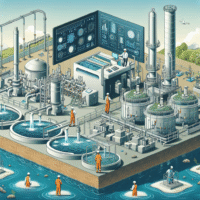Best Water Filtration System
The Ultimate Guide to the Best Water Filtration Systems
Introduction
Water is essential for life. It hydrates our bodies, supports our organs, and aids them in functioning properly. However, access to clean and safe drinking water is a significant concern across the globe. Contaminated water can lead to a range of health issues, from gastrointestinal diseases to long-term chronic conditions. This is where water filtration systems come into play, helping to ensure that the water we consume is free from harmful contaminants.
In this article, we will explore the best water filtration systems available today, discuss how they work, and help guide you in choosing the right one for your home. We will cover several types of filtration systems, their features, benefits, and potential drawbacks, equipping you with all the knowledge you need to make an informed decision.
Why Do You Need a Water Filtration System?
Before delving into the types of water filtration systems, it’s crucial to understand why you might need one.
1. Contaminants in Water
-
- Microbial Contaminants: Bacteria, viruses, and parasites can contaminate water sources and lead to severe health issues.
-
- Chemical Contaminants: Pesticides, heavy metals, and pharmaceuticals can seep into our water systems, impacting public health.
-
- Physical Contaminants: Sediment, dirt, and rust make drinking water unappealing and can damage plumbing systems.
2. Taste and Odor
Even if the water appears to be clean, there can be taste and odor issues stemming from chlorine, sulfur, or other substances. A good filtration system can vastly improve the quality of taste and smell of your water.
3. Environmental Impact
Plastic waste from bottled water significantly contributes to pollution. Installing a filtration system can reduce the reliance on bottled water, lowering your carbon footprint.
4. Cost Efficiency
While there is an upfront cost associated with purchasing a water filtration system, it can save you money in the long run. Spending on bottled water and maintenance will decrease once you have a reliable filtration system in place.
Types of Water Filtration Systems
The choice of water filtration system largely depends on the contaminants present in your water and the needs of your household. Below are the most common types:
1. Activated Carbon Filters
How They Work:
Activated carbon filters remove impurities through adsorption, the process where contaminants adhere to the surface of the carbon.
Pros:
-
- Effective at removing chlorine, sediment, and volatile organic compounds (VOCs).
-
- Improves taste and odor.
-
- Affordable and generally easy to install.
Cons:
-
- Not effective at removing minerals, salts, or metals.
-
- Requires regular replacement of filters.
2. Reverse Osmosis Systems
How They Work:
Reverse osmosis (RO) systems push water through a semi-permeable membrane that separates impurities from water.
Pros:
-
- Highly effective at removing a wide range of contaminants: heavy metals, salts, nitrates, and more.
-
- Can produce high-quality drinking water.
Cons:
-
- Wasteful: Can waste 3-4 gallons of water for every gallon filtered.
-
- Slow filtration process and can be expensive to install.
3. Ultraviolet (UV) Purification
How They Work:
UV purification uses ultraviolet light to kill or inactivate harmful microorganisms.
Pros:
-
- Effective in eliminating bacteria, viruses, and protozoa.
-
- Chemical-free method that does not alter the taste of water.
Cons:
-
- Does not remove chemical contaminants, solids, or heavy metals.
-
- Requires electricity to operate.
4. Whole House Filtration Systems
How They Work:
These systems connect directly to your plumbing and filter all the water entering your home.
Pros:
-
- Provides clean water for all uses: drinking, cooking, bathing, and washing.
-
- Reduces scale buildup in pipes and appliances.
Cons:
-
- Higher initial cost.
-
- May require professional installation.
5. Water Pitcher Filters
How They Work:
These portable filters are simple pitchers that contain a filter element for purifying drinking water.
Pros:
-
- Affordable and easy to use.
-
- Requires no installation.
Cons:
-
- Limited filtering capacity, suitable for small quantities.
-
- Requires regular filter changes.
6. Faucet-Mounted Filters
How They Work:
These filters attach directly to your kitchen faucet and provide filtered water on-demand.
Pros:
-
- Easy to install and convenient.
-
- Effective at removing common contaminants like chlorine and sediment.
Cons:
-
- May reduce water pressure.
-
- Requires regular filter replacements.
How to Choose the Best Water Filtration System for You
Now that you are familiar with different types of water filtration systems, it’s essential to consider several factors to choose the best one for your needs.
1. Identify Your Water Quality Needs
You can start by having your water tested for common contaminants. Home testing kits are available, or you can hire professionals. The results will guide your decision on the best filtration system for your specific needs.
2. Consider Your Household’s Water Usage
If you have a larger family, you may want to consider a whole-house filtration system. For individuals or small households, a pitcher filter or faucet-mounted filter may suffice.
3. Understand Your Budget
Water filtration systems vary widely in cost. Establish a budget that includes initial purchase cost, installation (if necessary), and maintenance costs. Remember that some systems have ongoing costs for filter replacements.
4. Space Consideration
Check the available space where you plan to install the unit. Some systems, like whole-house filters and reverse osmosis systems, require more room than others.
5. Research Brands and Reviews
Look for reputable brands and read consumer reviews. User feedback can provide insight into the real-world performance and effectiveness of different systems.
Top Water Filtration Systems of 2023
To assist you in selecting the best water filtration system, we’ve compiled a list of top-rated systems based on performance, reviews, and features.
1. APEC Top Tier 5-Stage Reverse Osmosis Water Filter
Overview
APEC is known for its quality filtration. This system produces clean and safe drinking water through a five-stage process.
Features
-
- Removes up to 99% of contaminants.
-
- Provides a high flow rate.
-
- Long-lasting filters with a lifespan of 6-12 months.
Pros
-
- Excellent taste and purity.
-
- Easy installation process.
-
- High-quality materials.
Cons
-
- Some users report water waste during filtration.
2. Brita Large 10-Cup Water Filter Pitcher
Overview
Brita is a renowned name in home water filtration. This pitcher is perfect for individuals or small families.
Features
-
- Reduces chlorine, mercury, and cadmium.
-
- BPA-free and dishwasher safe.
Pros
-
- Affordable and easy to use.
-
- Removes contaminants while improving taste.
Cons
-
- Limited to the pitcher’s capacity.
-
- Requires frequent filter changes.
3. iSpring Whole House Water Filtration System
Overview
Ideal for families, the iSpring system filters water throughout your entire home.
Features
-
- Multi-stage filtration with sediment filters and GAC filters.
-
- Easy to change filters and maintenance.
Pros
-
- Provides clean water for all uses.
-
- Easy to install for DIY enthusiasts.
Cons
-
- Initial setup cost may be high.
4. Culligan FM-15A Faucet Mount Filter
Overview
This is a popular faucet-mounted filter that’s easy to install and use.
Features
-
- Reduces over 99% of lead and other contaminants.
-
- Simple switch between filtered and unfiltered water.
Pros
-
- Quick and easy installation.
-
- Cost-effective filter replacement.
Cons
-
- Filter needs changing every 2 months.
5. Home Master TMAFC-ERP Artesian Full Contact Reverse Osmosis System
Overview
This advanced reverse osmosis system offers excellent filtration while providing essential minerals back into the water.
Features
-
- Five-stage filtration.
-
- High recovery rate, reducing water waste.
Pros
-
- Provides superior taste.
-
- Long-lasting filters.
Cons
-
- Higher price point.
Maintenance Tips for Water Filtration Systems
To keep your filtration system functioning optimally, regular maintenance is necessary. Here are some maintenance tips:
-
- Change Filters Regularly:
-
- Keep track of when you need to replace filters, as indicated by the manufacturer.
-
- Change Filters Regularly:
-
- Monitor Water Quality:
-
- Regularly inspect the water quality to ensure contaminants are being adequately removed.
-
- Monitor Water Quality:
-
- Inspect for Leaks:
-
- Regularly check connections for any leaks that may develop over time.
-
- Inspect for Leaks:
-
- Follow Manufacturer Instructions:
-
- Always adhere to the manufacturer’s guidelines for maintenance and care.
-
- Follow Manufacturer Instructions:
Conclusion
Choosing the right water filtration system is a vital investment in your health and well-being. With so many options available, it’s crucial to perform thorough research based on your specific needs, budget, and preferences.
Whether you opt for a simple pitcher filter or a comprehensive whole-house system, ensure that your choice adheres to the standards of safety and efficiency required to provide you and your family with clean, fresh drinking water.
With increasing awareness of water contamination issues and health benefits of drinking clean water, making a decision to filter the water you consume is more pertinent than ever. By following the guidelines in this article, you’ll be equipped to make a well-informed choice that meets your needs.
Remember that investing in a quality water filtration system is not merely an expense; it’s a commitment to a healthier lifestyle.



